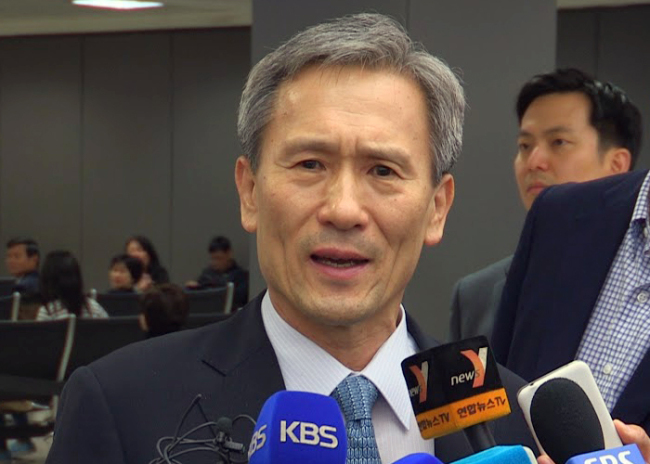South Korea is expected to support the U.S.-led fight against the Islamic State militants with additional humanitarian assistance, Seoul’s presidential national security adviser said Sunday.
Kim Kwan-jin made the remark to reporters after arriving in Washington for talks with U.S. National Security Adviser Susan Rice. The fight against IS is expected to be a topic for Kim’s discussions with Rice as Washington is rallying international support for the drive.
“Operations to defeat IS are expected to be conducted mainly by the U.S. Air Force. Therefore, while expressing support for the international moves, we will do what we can do, which I believe would be within the scope of humanitarian assistance,” Kim told reporters upon arrival.
Kim noted that South Korea has already pledged $1.2 million in humanitarian assistance to Iraqi refugees displaced by the extremist group and said the country can consider providing additional assistance.
Last week, President Barack Obama announced his strategy to defeat IS, including building an international coalition of countries. South Korea was classified as a humanitarian assistance contributor, but there has been speculation Washington could ask for a contribution beyond that.
Kim declined to discuss such possibilities, saying there has been no such request from the U.S.
Kim Kwan-jin made the remark to reporters after arriving in Washington for talks with U.S. National Security Adviser Susan Rice. The fight against IS is expected to be a topic for Kim’s discussions with Rice as Washington is rallying international support for the drive.
“Operations to defeat IS are expected to be conducted mainly by the U.S. Air Force. Therefore, while expressing support for the international moves, we will do what we can do, which I believe would be within the scope of humanitarian assistance,” Kim told reporters upon arrival.
Kim noted that South Korea has already pledged $1.2 million in humanitarian assistance to Iraqi refugees displaced by the extremist group and said the country can consider providing additional assistance.
Last week, President Barack Obama announced his strategy to defeat IS, including building an international coalition of countries. South Korea was classified as a humanitarian assistance contributor, but there has been speculation Washington could ask for a contribution beyond that.
Kim declined to discuss such possibilities, saying there has been no such request from the U.S.

He is scheduled to meet with Rice on Monday. The three-day visit is Kim’s first overseas trip since assuming office as Seoul’s top security official in June after serving as defense minister for nearly four years.
“Without limiting topics to any specific issue, I will hold discussions on a variety of matters, including the issues of North Korea, its nuclear program, pending issues on the Korea-U.S. alliance, and Northeast Asia and global issues,” Kim told reporters upon arrival.
Kim’s visit came as North Korea has been stepping up diplomacy with the outside world in an attempt to reduce its isolation, while at the same time using three American citizens detained in the country as leverage to reopen dialogue with the U.S.
Other topics for Kim’s talks with Rice could include the issue of delaying the planned transfer of wartime operational control
(OPCON) of South Korean troops from Washington to Seoul and a U.S.
plan to deploy a Terminal High Altitude Area Defense missile defense battery to South Korea.
Kim told reporters Sunday that he expects OPCON discussions between Seoul and Washington will go smoothly under the objective of producing an agreement at next month’s annual defense ministers’ talks, known as the Security Consultative Meeting.
On the planned U.S. deployment of a THAAD battery, Kim said that Seoul has been given no official notification from the U.S.
and that there have been no discussions between the two countries on the issue either.
It is a sensitive issue because the planned deployment is seen as U.S. pressure on Seoul to buy a THAAD system, a key component of the U.S. missile defense system. It could also inflame tensions with China and Russia as the two countries see the U.S. move as a threat to their national and security interests.
(Yonhap)
-
Articles by Korea Herald











![[Hello India] Hyundai Motor vows to boost 'clean mobility' in India](http://res.heraldm.com/phpwas/restmb_idxmake.php?idx=644&simg=/content/image/2024/04/25/20240425050672_0.jpg&u=)








